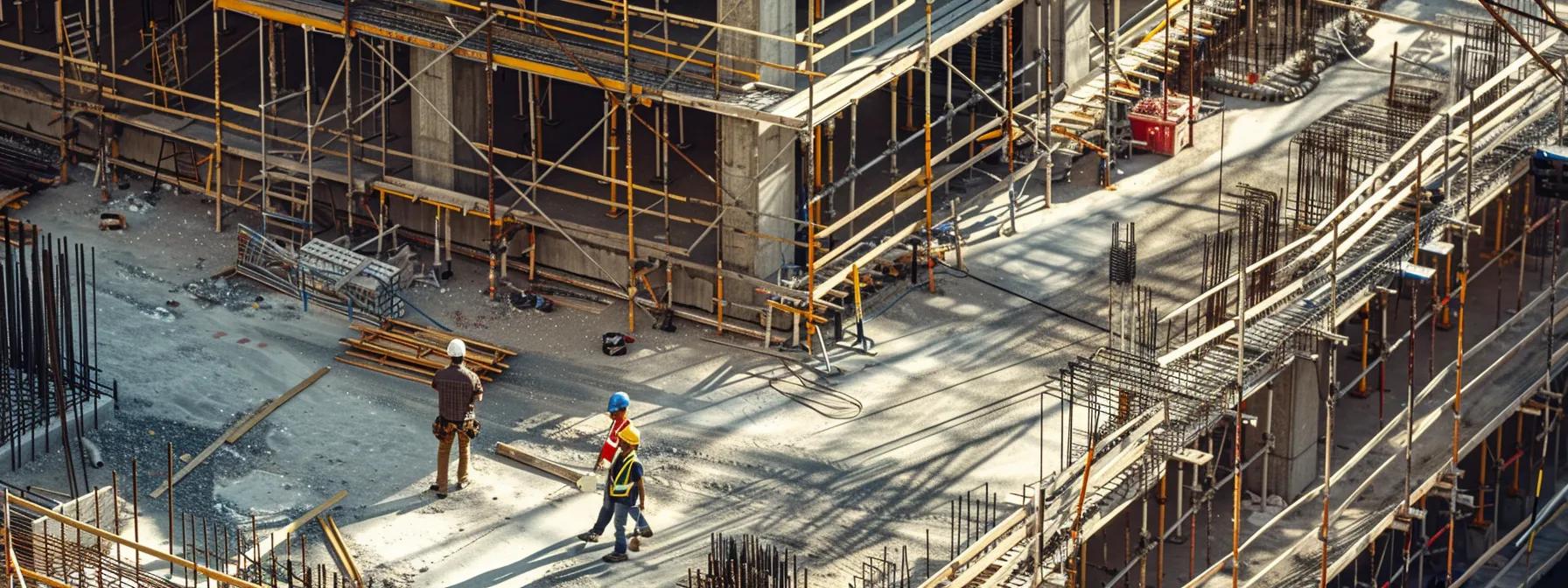Table Of Contents:
- Quality Commercial Construction Contractors Near Me
- Identifying Leading Commercial Construction Companies Near Me
- Finding Expert Commercial Concrete Contractors Near Me for Your Needs
- Core Attributes Distinguishing Quality Commercial Construction Contractors
- Services Offered by Commercial Construction Contractors in Your Area
- The Method for Choosing Your Ideal Commercial Construction Partner
- Advantages of Engaging Local Commercial Construction Professionals
- Frequently Asked Questions
Quality Commercial Construction Contractors Near Me
This article provides detailed insights into what makes a quality commercial construction contractor, such as a reputable general contractor, stand out locally. Commercial construction projects require robust planning, quality workmanship, and transparency from design to completion. For business owners, property managers, and organizations looking for dependability—perhaps even using a general contractor near me search—the right partner is critical to ensuring budget adherence, timely completion, and safety. This guide explains how to identify reputable local companies, verify their credentials, compare services, and make an informed final decision.
Each section below addresses crucial aspects of the selection process, including regional qualifications, service offerings, and quality indicators for workmanship and safety protocols to reduce risks and drive cost efficiency while contributing to the local economy.
Identifying Leading Commercial Construction Companies Near Me
Identifying top local construction companies is the first step toward securing seasoned professionals for your project. Leading companies often have extensive project histories, strong reputations, and are known for reliability and quality. Evaluating company portfolios, online testimonials, and case studies offers confidence in their ability to deliver on time and within budget, while also highlighting the challenges they have overcome.
Assessing Local Company Reputations and Project Histories
Reliable firms maintain robust portfolios featuring commercial renovations, new building constructions, and specialty projects. They document timelines, budget adherence, and work complexities. Client testimonials, third-party reviews, and industry awards further affirm their commitment to quality. Digital platforms are commonly used to showcase completed projects with images and details, illustrating the contractor’s ability to adapt and deliver aesthetically pleasing, structurally sound solutions. Long-term relationships with suppliers and regulatory bodies also underline their credibility.
Verifying Credentials and Insurance of Nearby Construction Firms
Selecting a contractor requires verifying that they hold the necessary licenses, certifications, and insurance policies (e.g., general liability, workers’ compensation). Valid credentials signify adherence to industry standards in workmanship, safety, and environmental compliance. Up-to-date documentation confirming the contractor’s ability to handle complex structural challenges and maintain safety protocols minimizes risks and potential delays due to legal or regulatory issues.
Understanding the Service Spectrum of Local Commercial Companies
Quality contractors offer a broad range of services, from new building design and erection to full-scale renovations and tenant improvements. Many also specialize in industrial, warehouse construction, and site development. A wide service spectrum signals innovative solutions and adaptable project management ideal for varied commercial needs. Inquiries about additional offerings such as sustainable building practices, risk management, or LEED certification can further distinguish top-performing companies.
Reviewing Client Feedback for Area Construction Businesses
Client feedback provides valuable insights regarding operational efficiency, quality workmanship, and communication. Online reviews, testimonial videos, and referrals reveal recurring themes like punctual completion and effective project management. Documenting past client experiences with measurable results (for example, high customer satisfaction ratings) helps ensure you select a partner known for clear communication and consistent delivery.
Finding Expert Commercial Concrete Contractors Near Me for Your Needs
Concrete is a foundational element for commercial projects, essential for structural integrity and longevity. Expert concrete contractors have specialized skill sets that cover a wide range of applications, from large foundation slabs and durable walkways to decorative finishes.
Defining Your Specific Commercial Concrete Project Requirements
Begin by defining your project needs—whether it involves new slab installations, repairs, or decorative finishes such as polished or stamped concrete. Consider factors like load-bearing capacity, environmental exposure, and longevity requirements. For high-traffic areas, reinforced concrete with specific admixtures is often necessary. Detailed planning will help with obtaining accurate cost estimates, refining project timelines, and coordinating required equipment and subcontractors.
Evaluating the Experience of Local Concrete Specialists
Experienced concrete contractors possess technical expertise, a deep understanding of material properties, and familiarity with modern installation and curing methods. They usually have extensive field experience ranging from multi-storey buildings to industrial warehouses. Detailed project histories and client testimonials provide assurance of their ability to manage challenges such as cracking, shrinkage, and surface imperfections while delivering durable, high-quality results.
Examining Past Concrete Work by Nearby Contractors
Review past concrete projects to gauge a contractor’s competency. High-quality work is characterized by uniform finishes, precision, and defect resistance. Case studies or portfolios that document concrete mix specifications, curing methods, and finishing techniques are helpful. On-site visits to ongoing or completed projects can confirm consistency in transitions, minimal cracking, and overall robustness against wear.
Inquiring About Concrete Mix Designs and Material Quality
Inquire about the specifics of concrete mix designs, including the combination of cement, aggregates, water, and admixtures used to enhance durability and workability. Transparent contractors will discuss the benefits of various formulations and their supplier partnerships, ensuring access to high-quality raw materials. This attention to detail in material selection and mix design is critical to the long-term success of your project.
Core Attributes Distinguishing Quality Commercial Construction Contractors
Quality contractors set themselves apart through attributes that ensure projects meet both regulatory and aesthetic standards. These core attributes include dedication to superior materials and workmanship, adherence to strict safety protocols, and a proven record of delivering projects on time and within budget.
Dedication to Superior Building Materials and Workmanship
Top contractors emphasize quality by sourcing superior materials—from structural steel and reinforced concrete to finishing touches. They maintain strong relationships with reputable manufacturers and invest in ongoing workforce training. This commitment results in visually appealing, structurally durable projects with few post-construction issues, supported by rigorous quality control measures and, at times, adherence to green building practices like LEED.
Demonstrated Record of Meeting Project Timelines and Budgets
A contractor’s consistent delivery on schedule and within budget is a critical indicator of reliability. Detailed project management frameworks, complete with scheduled updates and contingency plans, enable them to navigate unexpected delays and cost overruns effectively. Documented performance metrics and case studies further underscore their efficiency and financial transparency, ensuring both feasibility and client satisfaction.
Clear Communication Practices and Transparent Project Management
Effective project management relies on clear communication. Quality contractors maintain regular meetings, written progress reports, and real-time tracking through project management software. Their practice of setting realistic expectations and discussing potential risks openly helps minimize surprises and build trust, often leading to stronger client relationships and better project outcomes.
Adherence to Safety Protocols on Commercial Job Sites
Safety is paramount in commercial construction. Leading contractors implement comprehensive safety programs, including regular training, strict onsite inspections, and detailed safety plans aligned with federal and local regulations. Their proven track record of minimal accidents—augmented by modern safety technologies—demonstrates their commitment to protecting both workers and project integrity.
Problem-Solving Capabilities for Construction Challenges
Construction projects can be unpredictable; therefore, effective problem-solving is essential. Quality contractors proactively address issues such as design changes, supply delays, or unforeseen structural complications with innovative, documented strategies. Their collaborative approach and real-time communication ensure that any problems are resolved swiftly, minimizing impacts on timelines and budgets.
Services Offered by Commercial Construction Contractors in Your Area
Contractors typically provide a comprehensive range of services, covering everything from initial design through construction management and renovation. Their diverse offerings allow clients to manage projects holistically under one roof.
New Commercial Building Design and Erection
This core service begins with collaborative planning among architects, engineers, and contractors, using modern tools like CAD and BIM for precise design. During erection, experienced teams coordinate structural installations and prefabricated components to ensure compliance with local codes and safety regulations. The result is a visually appealing, durable building constructed efficiently and safely.
Full-Scale Commercial Renovation and Remodeling Services
Renovation and remodeling services update or repurpose existing facilities. These projects involve interior upgrades, expansion modifications, and compliance improvements. Specialized contractors manage the challenges of retrofitting older structures while integrating energy-efficient and sustainable designs to enhance overall functionality and market value.
Tenant Improvement and Interior Fit-Out Projects
Tailored tenant improvements and interior fit-outs focus on adapting interior spaces to meet specific operational needs. This may include reconfiguring layouts, upgrading lighting, HVAC, and communication systems. Contractors work closely with clients to ensure that the final design promotes workplace productivity while minimizing operational downtime.
Specialized Industrial and Warehouse Construction
For projects demanding large, open spaces with high load capacities, specialized industrial and warehouse construction services are essential. These contractors design facilities with advanced fire suppression, specialized flooring, and climate control solutions that meet strict safety standards and operational efficiency requirements.
Site Development and Infrastructure Work by Local Experts
Site development services cover grading, drainage, paving, landscaping, and utility installations. Local contractors leverage their regional expertise to prepare sites effectively, ensuring stable foundations and resolving potential water management issues. This comprehensive groundwork is crucial to enhancing the overall structural integrity and longevity of the project.
The Method for Choosing Your Ideal Commercial Construction Partner
Choosing the right construction partner involves a systematic evaluation of proposals, interviews, and reference checks. Each project represents a significant financial investment; therefore, it is essential to select a contractor who meets technical, aesthetic, budgetary, and timeline requirements.
Requesting Comprehensive Proposals From Area Construction Firms
Begin by requesting detailed proposals that outline the project scope, cost breakdowns, timelines, and material quality specifications. These proposals provide a benchmark for comparing how various contractors plan to manage risks and any potential modifications. Look for inclusion of contingency plans and references to similar projects as a sign of professionalism and thoroughness.
Comparing Service Offerings and Cost Estimates Carefully
When comparing proposals, consider not only the cost but also the depth of services provided. Evaluate the materials, technologies, and strategic planning outlined by each contractor to assess true value. A comparative table documenting factors like price, timeline, past performance, and service uniqueness can assist in making an informed decision.
Conducting Interviews With Potential Commercial Contractors
Interviews allow for a deeper assessment of a contractor’s communication, problem-solving abilities, and operational transparency. Focus on discussing past project challenges, cost control measures, safety protocols, and strategies for managing complex projects. Contractors who provide confident, detailed responses with supporting evidence are likely to be reliable partners.
Checking References From Previous Commercial Clients
Verifying references from past clients is essential. Solicit feedback on the contractor’s time management, budget adherence, quality of work, and post-project support. Multiple references across various project types can provide a well-rounded view of their performance, confirming the contractor’s reliability and responsiveness to client needs.
Understanding Contract Terms Before Finalizing Your Selection
Before making your final decision, review contract terms in detail. The contract should clearly document services, cost breakdowns, milestones, timelines, and responsibilities. Involving legal counsel experienced in construction law can help ensure that warranty terms, change order procedures, and risk allocation measures protect your interests and prevent disputes.
Advantages of Engaging Local Commercial Construction Professionals
Engaging local professionals offers numerous benefits, including deep knowledge of regional codes, expedited project mobilization, and enhanced community economic support.
Knowledge of Regional Building Ordinances and Permitting
Local experts are well-versed in regional building codes and permitting processes, which simplifies approvals and reduces the likelihood of delays. Their established relationships with local permitting offices help expedite applications and resolve issues promptly, keeping your project on track.
Quicker Mobilization and On-Site Project Accessibility
The local presence of contractors facilitates faster mobilization, quicker material deliveries, and immediate on-site interventions. This accessibility improves overall project oversight, maintains quality control, and minimizes downtime, ensuring a smoother construction process.
Strengthening Your Local Economic Environment
Hiring local contractors supports the regional economy by creating jobs and promoting local suppliers. These firms are invested in maintaining a strong community presence and are more likely to tailor projects to local cultural and environmental contexts, contributing to sustainable local growth.
Established Networks With Local Material Suppliers and Subcontractors
Local contractors benefit from established networks with nearby suppliers and subcontractors. These relationships ensure smoother procurement processes, timely deliveries, competitive pricing, and overall improved efficiency in managing large-scale projects.
Frequently Asked Questions
Q: How do I verify a commercial construction contractor’s credentials? A: Review the contractor’s licenses, certifications, and insurance policies in public records and request documentation. Ask for detailed case studies or references to confirm their experience aligns with your project needs.
Q: What should I look for in a proposal from a commercial construction firm? A: Look for a detailed project scope, comprehensive cost breakdowns, realistic timelines, and clearly described quality control measures. Transparency in contingency planning and change orders indicates professionalism.
Q: Why is local expertise important in commercial construction projects? A: Local expertise ensures familiarity with regional codes, permitting procedures, and climate-related considerations. This minimizes delays and legal issues while streamlining project management.
Q: How can I compare cost estimates from different commercial contractors? A: Compare detailed service breakdowns, focusing not only on cost but also on the quality of materials and processes included. A comparative table outlining price, timeline, and service offerings can help determine overall value.
Q: What role does safety play in choosing a commercial contractor? A: Safety is critical. Quality contractors adhere to rigorous safety protocols, conduct regular site inspections, and maintain detailed training programs. A strong safety record is a key indicator of commitment to protecting workers and ensuring project continuity.
Q: How do I ensure that my project stays on budget and on schedule? A: Request comprehensive proposals, conduct thorough interviews, and ensure the contract includes detailed milestones and penalty clauses. Regular progress meetings and transparent project management help monitor and address issues early on.
Q: What factors contribute to the quality of commercial construction work? A: Superior building materials, skilled workmanship, strict adherence to safety protocols, efficient project management, and a solid reputation from past projects all contribute to delivering durable, aesthetically pleasing, and compliant structures.
| Service Category | Key Feature | Benefit | Example |
|---|---|---|---|
| New Building Design | Advanced CAD/BIM Integration | Streamlined design and planning | High-rise office complex |
| Renovation and Remodeling | Customized Interior Fit-Out | Enhanced functionality | Multi-tenant commercial space |
| Tenant Improvement | Tailored Space Adaptation | Increased productivity | Modernized retail outlet |
| Industrial Construction | Heavy-Duty Structural Design | Improved load-bearing capacity | Warehouse with advanced logistics |
| Site Development | Comprehensive Groundwork | Reliable foundation and utility setup | New shopping center redevelopment |
The table above summarizes key service categories offered by commercial construction contractors, illustrating their features, benefits, and real-world examples.





